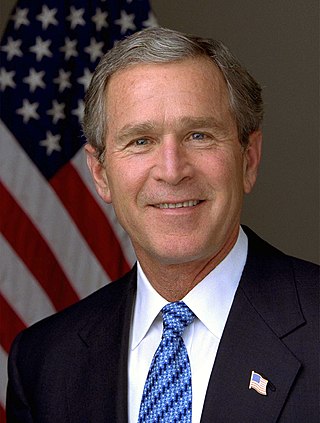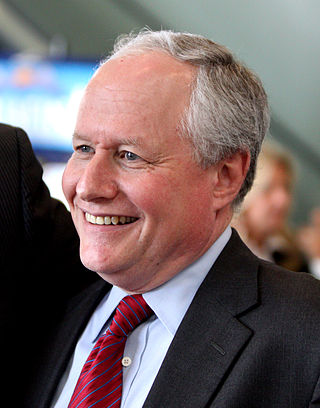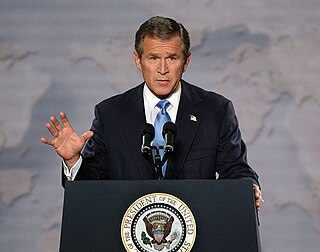
Saddam Hussein Abd al-Majid al-Tikriti was an Iraqi politician and revolutionary who served as the fifth president of Iraq from 1979 to 2003. He also served as prime minister of Iraq from 1979 to 1991 and later from 1994 to 2003. He was a leading member of the revolutionary Arab Socialist Ba'ath Party, and later, the Baghdad-based Ba'ath Party and its regional organization, the Iraqi Ba'ath Party, which espoused Ba'athism, a mix of Arab nationalism and Arab socialism.

George W. Bush's tenure as the 43rd president of the United States began with his first inauguration on January 20, 2001, and ended on January 20, 2009. Bush, a Republican from Texas and the eldest son of George H. W. Bush, took office following a narrow victory over Democratic incumbent vice president Al Gore in the 2000 presidential election. Four years later, in the 2004 presidential election, he defeated Democrat nominee John Kerry to win re-election. Bush was succeeded by Democrat Barack Obama, who won the 2008 presidential election.

Paul Dundes Wolfowitz is an American political scientist and diplomat who served as the 10th President of the World Bank, U.S. Deputy Secretary of Defense, U.S. Ambassador to Indonesia, and dean of Paul H. Nitze School of Advanced International Studies (SAIS) at Johns Hopkins University. He is currently a visiting scholar at the American Enterprise Institute.
The Project for the New American Century (PNAC) was a neoconservative think tank based in Washington, D.C., that focused on United States foreign policy. It was established as a non-profit educational organization in 1997, and founded by William Kristol and Robert Kagan. PNAC's stated goal was "to promote American global leadership". The organization stated that "American leadership is good both for America and for the world", and sought to build support for "a Reaganite policy of military strength and moral clarity".

William Kristol is an American neoconservative writer. A frequent commentator on several networks including CNN, he was the founder and editor-at-large of the political magazine The Weekly Standard. Kristol is now editor-at-large of the center-right publication The Bulwark and and has been the host of Conversations with Bill Kristol, an interview web program, since 2014.

The United States-led invasion of the Republic of Iraq was the first stage of the Iraq War. The invasion phase began on 19 March 2003 (air) and 20 March 2003 (ground) and lasted just over one month, including 26 days of major combat operations, in which a combined force of troops from the United States, the United Kingdom, Australia and Poland invaded Iraq. Twenty-two days after the first day of the invasion, the capital city of Baghdad was captured by coalition forces on 9 April 2003 after the six-day-long Battle of Baghdad. This early stage of the war formally ended on 1 May 2003 when U.S. President George W. Bush declared the "end of major combat operations" in his Mission Accomplished speech, after which the Coalition Provisional Authority (CPA) was established as the first of several successive transitional governments leading up to the first Iraqi parliamentary election in January 2005. U.S. military forces later remained in Iraq until the withdrawal in 2011.

Richard Norman Perle is an American political advisor who served as the Assistant Secretary of Defense for Global Strategic Affairs under President Ronald Reagan. He began his political career as a senior staff member to Senator Henry "Scoop" Jackson on the Senate Armed Services Committee in the 1970s. He served on the Defense Policy Board Advisory Committee from 1987 to 2004 where he served as chairman from 2001 to 2003 under the Bush Administration before resigning due to conflict of interests.
Randall James "Randy" Scheunemann is an American neoconservative lobbyist. He is the President of the Committee for the Liberation of Iraq, which was created by the Project for the New American Century (PNAC), of which he is a board member. He was Trent Lott's National Security Aide and was an advisor to Defense Secretary Donald Rumsfeld on Iraq. He is a paid lobbyist for the country of Georgia and was 2008 presidential candidate John McCain's foreign policy aide.
The Office of Special Plans (OSP), which existed from September 2002 to June 2003, was a Pentagon unit created by Paul Wolfowitz and Douglas Feith, and headed by Feith, as charged by then–United States Secretary of Defense Donald Rumsfeld, to supply senior George W. Bush administration officials with raw intelligence pertaining to Iraq. A similar unit, called the Iranian Directorate, was created several years later, in 2006, to deal with intelligence on Iran.
Laurie Mylroie is an American author and analyst who has written extensively on Iraq and the War on Terror. The National Interest first published this work in an article entitled, "The World Trade Center Bombing: Who is Ramzi Yousef? And Why it Matters." In her book Study of Revenge (2000), Mylroie laid out her argument that the Iraqi regime under Saddam Hussein had sponsored the 1993 World Trade Center bombing and subsequent terrorist attacks. She claimed those attacks were part of an ongoing war that Saddam waged against America following the cease-fire to the 1991 Gulf War. Less than a year after her book was published, the September 11 attacks occurred. Mylroie subsequently adopted the view that Saddam had been responsible for the attacks, defending it on many occasions, including before the 9/11 Commission.

In political science, rollback is the strategy of forcing a change in the major policies of a state, usually by replacing its ruling regime. It contrasts with containment, which means preventing the expansion of that state; and with détente, which means developing a working relationship with that state. Most of the discussions of rollback in the scholarly literature deal with United States foreign policy toward communist countries during the Cold War. The rollback strategy was tried and was not successful in Korea in 1950 and in Cuba in 1961, but it was successful in Grenada in 1983. The United States discussed the use of rollback during the East German uprising of 1953 and the Hungarian Revolution of 1956, which were ultimately crushed by the Soviet Army, but decided against it to avoid the risk of a major war.

The Senate Report on Iraqi WMD Intelligence was the report by the United States Senate Select Committee on Intelligence concerning the U.S. intelligence community's assessments of Iraq during the time leading up to the 2003 invasion of Iraq. The report, which was released on July 9, 2004, identified numerous failures in the intelligence-gathering and -analysis process. The report found that these failures led to the creation of inaccurate materials that misled both government policy makers and the American public.

"The wrong war, at the wrong place, at the wrong time, and with the wrong enemy" is General Omar Bradley's famous rebuke in his May 15, 1951 Congressional testimony as the Chairman of the Joint Chiefs of Staff to the idea of extending the Korean War into China, as proposed by General Douglas MacArthur, the commander of the U.N. forces in Korea before being relieved of command by President Harry Truman on April 11, 1951.
Bruce Pitcairn Jackson is the founder and president of the Project on Transitional Democracies. The project is a multi-year endeavor aimed at accelerating the pace of reform in post-1989 democracies and advancing the date for the integration of these democracies into the institutions of the Euro-Atlantic.
The Saddam–al-Qaeda conspiracy theory was based on false claims made by the United States government, alleging that a highly secretive relationship existed between Iraqi president Saddam Hussein and the Sunni pan-Islamist militant organization al-Qaeda between 1992 and 2003. The George W. Bush administration promoted it as a main rationale for invading Iraq in 2003.
The term liberal hawk refers to a politically liberal person who supports a hawkish, interventionist foreign policy.

There are various rationales for the Iraq War, both the 2003 invasion of Iraq and the subsequent hostilities. The George W. Bush administration began actively pressing for military intervention in Iraq in late 2001. The primary rationalization for the Iraq War was articulated by a joint resolution of the United States Congress known as the Iraq Resolution. The US claimed the intent was to "disarm Iraq of weapons of mass destruction, to end Saddam Hussein's support for terrorism, and to free Iraqi people".

Prior to the Iraq War, the United States accused it of developing weapons of mass destruction and having links with al-Qaeda. In 1991, the United Nations Security Council Resolution 687 was adopted and subsequent UN weapons inspectors were inside Iraq. This period also saw low-level hostilities between Iraq and the United States-led coalition from 1991–2003.

The Iraqi conflict refers to a near-continuous series of events that began with the 2003 invasion of Iraq and deposition of Iraqi president Saddam Hussein.











